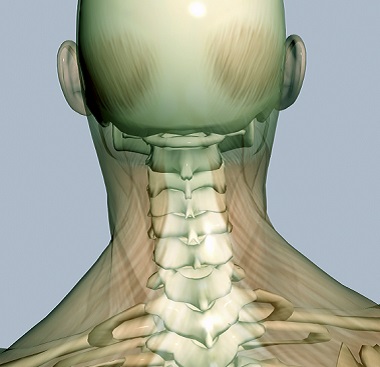Sport Rehabilitation and Physiotherapy for Neck Pain
 The neck is the upper part of the spinal column – the top seven vertebrae we call the cervical spine.
The neck is the upper part of the spinal column – the top seven vertebrae we call the cervical spine.
We provide sport rehabilitation and physiotherapy for neck pain, stiffness, loss of mobility, weakness and headaches. So, if you are suffering with any of these symptoms, early diagnosis and treatment will help you achieve optimal recovery.
We will identify during your initial appointment whether the cause of your neck pain is musculoskeletal in nature and advise the most appropriate course of action.
Like any spinal condition, it can be extremely painful and worrying, especially if it affects your ability to carry out your normal lifestyle.
The earlier you seek therapy for cervical spine pain the better the results will be and you will also achieve them more quickly.
Common Questions about Neck Pain
What are the causes of my neck pain? 
Neck pain can be caused by many factors such as poor posture, age related degenerative changes, workstations that are set up incorrectly, carrying a bag on your shoulder, tucking your ear on your shoulder when using your phone, sleeping in awkward postures, prolonged static postures and of course trauma such as car accidents.
What will happen if I don’t get it treated?
If you don’t seek early treatment you may develop chronic symptoms and decrease your chance of optimal recovery.
What techniques might be used to relieve the pain in my neck?
Treatment comprises of many techniques dependent on your presentation including: massage, mobilisation, manipulation, electrotherapy, exercise programmes, re-education of posture, ergonomic and self-management advice.
How long does treatment take?
This of course can vary considerably dependent on many factors such as how early you seek treatment, the severity of your presentation, your age, fitness levels and your adherence to the advice given. We measure our outcomes at Metro Physio and the average treatment plan is approximately 5-7 sessions over a 3-6 week period.
Will I need surgery for neck pain?
It is incredibly rare that patients with neck pain go on to require surgery. It is only usually appropriate if nerves are being severely compressed and causing severe weakness in the arms.
What exercises can I do at home?
This depends on your presentation but the most important exercise is to keep correcting your neck posture throughout the day so your head is over your body and not poking forward. It is also helpful to maintain mobility by gently stretching to the side and rotating both directions.
Is it OK to crack my neck?
This noise is usually gas escaping from the small joints in your neck and although there is no research to say this causes harm there is also no research to say there is any benefit.
When is treatment with us not appropriate?
If you suffer from any of the following, we advise you urgently attend your GP to rule out that there is no other underlying pathology:
• Altered sensation/numbness in the face or scalp
• Blurred vision
• Dizziness
• Double vision
• Fainting
• Nausea
• Speech problems
• Swallowing difficulty
• Symptoms radiating down both arms
Common Conditions of the Cervical Spine
Some of the most common diagnosis of neck pain include:
- Cervical Facet Joint pain
- Cervical Spondylosis
- Whiplash
The cervical facet joints are the small joints between the upper vertebrae and can become painful due to normal age-related degenerative changes and poor posture that stresses the joints.
Cervical spondylosis is the name for more significant degenerative changes in the joints and soft tissue of the spinal column.
Whiplash is probably the best-known cause of neck pain and occurs due to sharp movements in the neck – such as during the rapid deceleration of a car crash which overstretches the soft tissues of the neck.
Together these causes of cervical spine pain cover many of the cases we treat and neck pain is our second-largest case load after lower back pain.

Practical Tips to Prevent Neck Pain
Many of the patients we treat for neck pain are victims of modern lifestyles and some of the everyday activities we all take for granted.
Here are some practical tips to prevent neck pain; –
- Maintain good posture
Keep your spine straight and your chin up. Good posture is a subject in its own right but by improving your posture you can equalise the pressure on your muscles and avoiding putting too much stress on the neck. Avoid carrying a bag on one shoulder or tucking your phone between your ear and shoulder.
- Sensible screen time
We all love looking at screens, whether it’s the TV, computer, tablet or smartphone, but be sensible about your usage. Regular breaks to look at things further away, to move around and to relax your neck can help prevent it from seizing up.
- Don’t keep still too long
Humans were designed to move, and inactivity is very poor for our physical and mental health. Keeping moving improves posture and strengthens the stabilising ligaments and muscles of the spine.
Get Treatment for Neck Pain
If you need sport rehabilitation or physiotherapy for neck pain, please get in touch. We can arrange an assessment to determine the cause of your neck pain and decide the best course of action.
To find out more about treatment for cervical spine pain, to diagnose your neck pain, or just to speak to a member of our team for more information contact us today.
